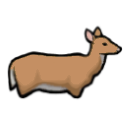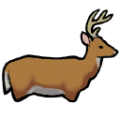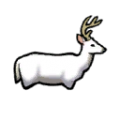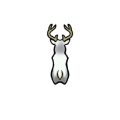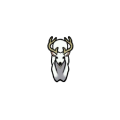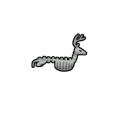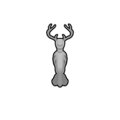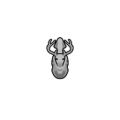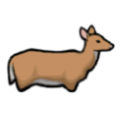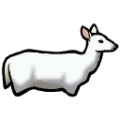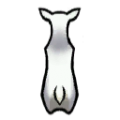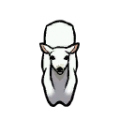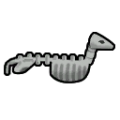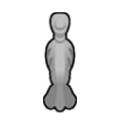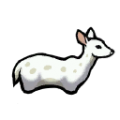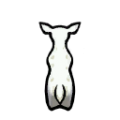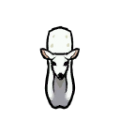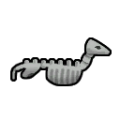Deer
Deer
A medium-sized herding herbivore which prefers to live in mixed forests and plains. Deer are very quick.
Base Stats
- Type
- Animal
- Flammability
- 70%
Pawn Stats
- Combat Power
- 50
- Move Speed
- 5.5 c/s
- Health Scale
- 90% HP
- Body Size
- 1.2
- Mass - Baby
- 14.4 kg
- Mass - Juvenile
- 36 kg
- Mass - Adult
- 72 kg
- Carrying Capacity
- 90
- Filth Rate
- 16
- Hunger Rate
- 0.32 Nutrition/Day
- Diet
- herbivorous
- Life Expectancy
- 15 years
- Coastal Animal
- false
- Manhunter Chance
- 0%
- Manhunter Chance (Taming)
- 0%
- Trainable Intelligence
- None
- Wildness
- 75%
- Minimum Handling Skill
- 8
- Roam Interval
- 2 days
- Mate Interval
- 12 hours
- Maturity Age
- 0.333 years (20 days)
- Juvenile Age
- 0.1 years (6 days)
- Toxic Resistance
- 50%
- Toxic Environment Resistance
- 0%
- Comfortable Temp Range
- -30 °C – 40 °C (-22 °F – 104 °F)
Production
- Meat Yield
 168 venison
168 venison- Leather Yield
 48 plainleather
48 plainleather- Gestation Period
- 5.661 days
- Offspring Per Birth
- 1
Melee Combat
- Attack 1
- Front left leg
7 dmg (Blunt)
10 % AP
2 second cooldown - Attack 2
- Front left leg
7 dmg (Poke)
10 % AP
2 second cooldown - Attack 3
- Front right leg
7 dmg (Blunt)
10 % AP
2 second cooldown - Attack 4
- Front right leg
7 dmg (Poke)
10 % AP
2 second cooldown - Attack 5
- Teeth
8 dmg (Bite)
12 % AP
2 second cooldown
0.5 chance factor - Attack 6
- Head
5 dmg (Blunt)
7 % AP
2 second cooldown
0.2 chance factor - Average DPS
- 2.2506
- tradeTags
- AnimalCommon
Deer are herding herbivorous animals that are found in temperate forests, temperate swamps, boreal forests, cold bogs, glacial plains![]() , and grasslands
, and grasslands![]() . Males of the species are called Bucks and can be distinguished by the presense of antlers and larger visual size, while females are called Does and are visually smaller and lack antlers. Young deer of both genders are light colored and spotted. Despite the visual differences, adult deer of both genders have the same stats and attacks.
. Males of the species are called Bucks and can be distinguished by the presense of antlers and larger visual size, while females are called Does and are visually smaller and lack antlers. Young deer of both genders are light colored and spotted. Despite the visual differences, adult deer of both genders have the same stats and attacks.
Acquisition[edit]
Deer can be found in temperate forests, temperate swamps, boreal forests, cold bogs, glacial plains![]() , and grasslands
, and grasslands![]() . They can either be tamed by a handler or self-tame in a random event.
. They can either be tamed by a handler or self-tame in a random event.
Summary[edit]
Deer are pen animals. Once tamed, pen animals cannot and do not need to be trained any further. But if left outside of a pen or caravan hitching spot, pen animals will eventually roam outside your colony. Making a caravan is not required to tie animals to a caravan hitching spot.
Analysis[edit]
Other than being an animal to be hunted, deer don't have much of a purpose.
Ibex are more efficient ranch animals, are easier to tame, and they can be found in all biomes that deer populate. Deer are better to hunt than ibex, as deer are larger targets (which won't revenge when hunted).
Nutrition[edit]
When slaughtered, a deer yields 35 meat and 17 leather as a baby; 84 meat and 28 as a juvenile; or 168 meat and 48 leather as an adult. 1 meat is equal to 0.05 nutrition.
An adult deer consumes 0.32 nutrition per day, and a doe creates up to 0.18 offspring per day.
- When offspring are slaughtered as babies, a doe will produce 0.31 nutrition of meat per day, giving an optimal nutrition efficiency of 96.6%.
- If the offspring are allowed to grow to adulthood, they will consume an additional 0.73 nutrition per day, but will instead yield 1.48 nutrition per day as they are slaughtered, resulting in an optimal nutrition efficiency of 141.4%.
When considering a population of equal numbers of males and females, these nutrition efficiencies fall to 48.3% for baby slaughter and 108.4% for adult slaughter.
As mentioned above, ibex, as well as horses, are superior for nutrition. Horses are also pack animals.
Training[edit]
This animal can be trained as follows:
| | |
| | |
| | |
| |
*As of version 1.1.2610, all animals can be tamed. The percentage of likelihood of success depends on factors such as the Animals Wildness Percentage, Pawn Handling Skill, and others. More information can be found on the animals page.
Health[edit]
The body part table is collapsed due to length. Expand to view.
| Part Name | Health | Quantity | Coverage[1] | Target Chance[2] | Subpart of | Internal | Capacity[3] | Effect if Destroyed/Removed |
|---|---|---|---|---|---|---|---|---|
| Body | 36 | 1 | 100% | 26% | N/A[4] | - | Death | |
| Spine | 22.5 | 1 | 3% | 3% | Body | Moving |
−100% Moving[5] | |
| Stomach | 18 | 1 | 3% | 3% | Body | Digestion |
−50% Digestion | |
| Heart | 13.5 | 1 | 3% | 3% | Body | Blood Pumping |
Death | |
| Lung | 13.5 | 2 | 3% | 3% | Body | Breathing |
−50% Breathing. Death if both lost. | |
| Kidney | 13.5 | 2 | 3% | 3% | Body | Blood Filtration | −50% Blood Filtration. Death if both lost. | |
| Liver | 18 | 1 | 3% | 3% | Body | Digestion |
Death | |
| Neck | 22.5 | 1 | 22% | 5.5% | Body | Eating Talking Breathing |
Death | |
| Head | 22.5 | 1 | 75% | 2.475% | Neck | - | Death | |
| Skull | 22.5 | 1 | 25% | 1.2375% | Head | - | Cannot be destroyed Increasing Pain based on damage. | |
| Brain | 9 | 1 | 70% | 2.8875% | Skull | Consciousness |
Death Damage always results in scarring. | |
| Eye | 9 | 2 | 12% | 1.98% | Head | Sight |
−25% Sight. −100% if both lost. Damage always results in scarring. 0% Hit Chance against Blunt damage. | |
| Ear | 10.8 | 2 | 8% | 1.32% | Head | Hearing |
−25% Hearing. −100% if both lost. | |
| Nose | 9 | 1 | 10% | 1.65% | Head | - | - | |
| AnimalJaw | 9 | 1 | 10% | 1.65% | Head | Manipulation |
−100% Manipulation. Can no longer use Bite attack. | |
| Front Leg | 27 | 2 | 7% | 5.95% | Body | Moving |
−25% Moving. −50% if both lost. Can no longer use Hoof attack.[6] | |
| Front Hoof | 9 | 2 | 15% | 1.05% | Front Leg | Moving |
−25% Moving. −50% if both lost. | |
| Rear Leg | 27 | 2 | 7% | 5.95% | Body | Moving |
−25% Moving. −50% if both lost. | |
| Rear Hoof | 9 | 2 | 15% | 1.05% | Rear Leg | Moving |
−25% Moving. −50% if both lost. |
- ↑ Coverage determines the chance to hit this body part. It refers to the percentage of the super-part that this part covers, before its own sub-parts claim their own percentage. For example, if the base coverage of the super-part is 100%, and the coverage of the part is 20%, 20% of hits would hit the part, and 80% the super-part. If the part had its own sub-part with 50% coverage, the chances would be 10% sub-part, 10% part, 80% super part.
- ↑ Target Chance is the actual chance for each part to be be selected as the target when each part's coverage has been taken into account(I.E. Neck covers 7.5% of Torso but Head covers 80% of Neck so it actually has only a 1.5% chance to be selected). This is not pure hit chance, as different damage types propagate damage in different ways. See that page for details.
- ↑ Note that capacities can affect other capacities in turn. Only the primary effect is listed. See specific pages for details.
- ↑ This is the part that everything else connects to to be considered 'connected'.
- ↑ If Moving drops below 16% a pawn cannot move.
- ↑ A Blunt/Poke attack with cooldown of 2s. The actual Hoof is unrelated
Attack table
| Attack (Damage type) |
DPS[1] (Post Hit Chance)[2] |
Dam. | Cool. | AP | Selection chance[3] | |
|---|---|---|---|---|---|---|
| Average | 3.63 (2.25) |
- | - | 10.5% | - | |
| Front left leg (Blunt) |
3.5 (2.17) |
7 | 2s | 10% | 18.75% | |
| Front left leg (Poke) |
3.5 (2.17) |
7 | 2s | 10% | 18.75% | |
| Front right leg (Blunt) |
3.5 (2.17) |
7 | 2s | 10% | 18.75% | |
| Front right leg (Poke) |
3.5 (2.17) |
7 | 2s | 10% | 18.75% | |
| Teeth (Bite) |
4 (2.48) |
8 | 2s | 12% | 25% | |
| Head (Blunt) |
2.5 (1.55) |
5 | 2s | 7% | 0% | |
- ↑ Note: This is the actual base average derived from the melee verb system updated in 1.1.2610, it may sometimes disagree with the listed value in the in-game infobox.
It may also change depending on the stats and the melee verbs available to the pawn. - ↑ Assuming a melee hit chance of 62%
- ↑ Chance for attack to be selected. It may change depending on the melee verbs available to the pawn.
